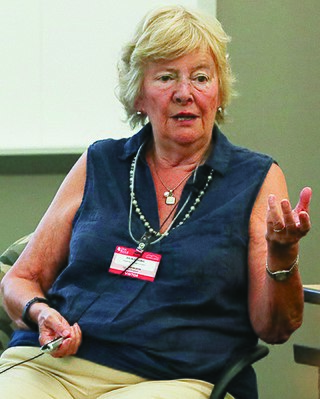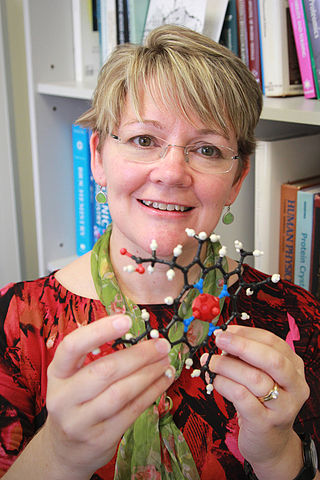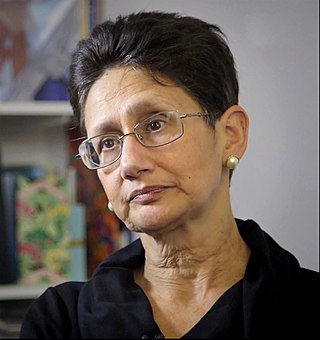Related Research Articles

Imperial College London is a public research university in London, United Kingdom. Its history began with Prince Albert, consort of Queen Victoria, who developed his vision for a cultural area that included the Royal Albert Hall, Victoria & Albert Museum, Natural History Museum and royal colleges. In 1907, Imperial College was established by a royal charter, which unified the Royal College of Science, Royal School of Mines, and City and Guilds of London Institute. In 1988, the Imperial College School of Medicine was formed by merging with St Mary's Hospital Medical School. In 2004, Queen Elizabeth II opened the Imperial College Business School.

Catherine Hall is a British academic. She is Emerita Professor of Modern British Social and Cultural History at University College London and chair of its digital scholarship project, the Centre for the Study of the Legacies of British Slavery. Her work as a feminist historian focuses on the 18th and 19th centuries, and the themes of gender, class, race and empire.

Dame Julia Stretton Higgins is a British polymer scientist. Since 1976 she has been based at the Department of Chemical Engineering at Imperial College London, where she is emeritus professor and senior research investigator.

Chelsea and Westminster Hospital is a 430-bed teaching hospital located in Chelsea, London. The hospital has a rich history in that it serves as the new site for the Westminster Hospital. It is operated by Chelsea and Westminster Hospital NHS Foundation Trust, and became a member of Imperial College Academic Health Science Centre in July 2020. The hospital is the central part of Imperial College London Chelsea and Westminster Campus, and plays an integral role in teaching students and medical research at Imperial College London.

Molly Christine Meacher, Baroness Meacher, known from 2000 to 2006 as Lady Layard, is a British life peer and former social worker.
Imperial College Healthcare NHS Trust is an NHS trust based in London, England. It is one of the largest NHS trusts in England and together with Imperial College London forms an academic health science centre.
UCLPartners is an academic health science centre located in London, England. It is the largest academic health science centre in the world, treats more than 1.5 million patients each year, has a combined annual turnover of around £2 billion and includes around 3,500 scientists, senior researchers and consultants.
Stephen Kevin Smith is an academic and health executive who led the creation of the United Kingdom's first Academic Health Science Centre at Imperial College London.
Central and North West London NHS Foundation Trust is an NHS Foundation Trust in England. It provides healthcare in London, Milton Keynes, Surrey and elsewhere. It was created in 2002 by a merger between Brent, Kensington & Chelsea and Westminster Mental Health NHS Trust, Harrow and Hillingdon Healthcare Trust, and the substance misuse service component of Hounslow and Spelthorne Community and Mental Health NHS Trust. It subsequently won additional contracts, including Milton Keynes Community Health Services from April 2013. It has substantial contracts for prison health services. CNWL is a member of Imperial College Health Partners.

Professor Jennifer Louise "Jenny" Martin is an Australian scientist, academic, and was recently the Deputy Vice-Chancellor at the University of Wollongong, in New South Wales. She is a former Director of the Griffith Institute for Drug Discovery at Griffith University. and a former Australian Research Council Laureate Fellow at the Institute for Molecular Bioscience, University of Queensland. Her research expertise lies in the areas of structural biology, protein crystallography, protein interactions and their applications in drug design and discovery.

Thomas Welton is a Professor of Sustainable Chemistry at Imperial College London. He served as Head of the Department of Chemistry from 2007 to 2014 and as Dean of the Faculty of Natural Sciences from 2015 to 2019. He is a Fellow and the current President of the Royal Society of Chemistry. Welton's research focuses on sustainable chemistry, with particular focus on ionic liquids and on solvent effects on chemical reactions. Welton is openly gay and is active in advocating for greater visibility for members of the LGBT community in the sciences. He is a member of the UKRI Equality, Diversity and Inclusion External Advisory Group.

Neena Modi is a British physician and Professor of Neonatal medicine at Imperial College London. She is the current president of the UK Medical Women’s Federation, and past-president of the Royal College of Paediatrics and Child Health, serving in this role from April 2015 to April 2018. She is one of only four women to ever hold this position.
Athena SWAN is a equality charter mark framework and accreditation scheme established and managed by the UK Equality Challenge Unit in 2005 that recognises and celebrates good practices in higher education and research institutions towards the advancement of gender equality: representation, progression and success.
Dame Helen Jayne Stokes-Lampard is a British medical academic and a general practitioner. She is Chair of the Academy of Medical Royal Colleges (AoMRC) a GP Principal and Chair of the National Academy for Social Prescribing (NASP). She was Chair of the Royal College of General Practitioners (RCGP) from November 2016 to November 2019. She is also a Professor of GP Education at Birmingham University and a visiting Chair at St George's Medical School in London. She has a particular interest in women's health.
Paul G. Ramchandani is a British consultant child and adolescent psychiatrist, and the first LEGO Professor of Play in Education, Development and Learning at the University of Cambridge, appointed in January 2018.
Ramani Moonesinghe OBE MD(Res) FRCP FRCA FFICM SFFMLM is Professor of Perioperative Medicine at University College London (UCL) and a Consultant in Anaesthetics and Critical Care Medicine at UCL Hospitals. Moonesinghe was Director of the National Institute for Academic Anaesthesia (NIAA) Health Services Research Centre between 2016 and 2022, and between 2016 and 2019 was Associate National Clinical Director for Elective Care for NHS England. In 2020 on she took on the role of National Clinical Director for Critical and Perioperative care at NHS England and NHS Improvement.
Lesley Francis Cohen is a Professor of solid-state physics at Imperial College London. She works in magnetic materials for solid-state magnetic refrigeration and spintronic applications. Cohen has served as the editor-in-chief of Applied Physics Letters since 2019.

Valerie Gibson, also known as Val Gibson, is a professor of Physics and Head of the High Energy Physics group at the University of Cambridge.
Professor Henrietta Bowden-Jones OBE is a medical doctor, Psychiatrist, Honorary Professor at University College London and Honorary Senior Visiting Fellow, Dept of Psychiatry at Cambridge University.
Frances Mary Heidensohn is an academic sociologist and criminologist at the London School of Economics, who is acknowledged as a pioneer in feminist criminology. Her 1968 article The Deviance of Women: A Critique and An Enquiry was the first critique of conventional criminology from a feminist perspective.
References
- 1 2 "Home - Emeritus Professor Dorothy Griffiths". www.imperial.ac.uk. Retrieved 2018-03-12.
- ↑ Griffiths, Prof. Dorothy Seymour. Who's Who 2019 . Oxford University Press. 1 December 2018. doi:10.1093/ww/9780199540884.013.U251048. ISBN 978-0-19-954088-4 . Retrieved 1 April 2019.
- ↑ "A fond farewell to Professor Dorothy Griffiths | Imperial News | Imperial College London". Imperial News. Retrieved 2018-03-12.
- ↑ Welsh, Tom (2012-05-24). "An MBA versus an MSc is not a straight battle" . Retrieved 2018-03-14.
- ↑ "The Cardiff Woman - Professor Dorothy Griffiths". Eventful. Retrieved 2018-03-14.
- ↑ "Imperial celebrates success in support for academic women". 2013-10-26. Retrieved 2018-03-14.
- ↑ (Archivist), Barrett, Anne (December 2016). Women at Imperial College : past, present and future. New Jersey. p. 351. ISBN 9781786342621. OCLC 981974924.
- ↑ "Publications - Emeritus Professor Dorothy Griffiths". www.imperial.ac.uk. Retrieved 2018-03-14.
- ↑ "Dorothy Griffiths – Feminist Review Trust | promosaik.com". www.promosaik.com. Retrieved 2018-03-12.
- ↑ "About the Feminist Review Trust | Feminist Review Trust". www.feminist-review-trust.com. Retrieved 2018-03-12.
- ↑ WISE. "Inspiration | WISE Knowledge Sharing event at Imperial College London". www.wisecampaign.org.uk. Retrieved 2018-03-14.
- ↑ "Imperial celebrates support for academic women | Imperial News | Imperial College London". Imperial News. Retrieved 2018-03-14.
- ↑ "Departments recognised for women-friendly work practices give advice on how to win a Silver SWAN | Imperial News | Imperial College London". Imperial News. Retrieved 2018-03-14.
- ↑ "Imperial celebrates success in support for academic women | Imperial News | Imperial College London". Imperial News. Retrieved 2018-03-14.
- ↑ "Imperial champions support for academic women | Imperial News | Imperial College London". Imperial News. Retrieved 2018-03-14.
- ↑ "Imperial receives Athena SWAN awards for efforts in promoting women in science | Imperial News | Imperial College London". Imperial News. Retrieved 2018-03-14.
- ↑ Bruin, Abigail E de. "Imperial celebrates women in Science" . Retrieved 2018-03-14.
- ↑ "Impact of Athena SWAN". Science in Australia Gender Equity (SAGE). 2016-02-10. Retrieved 2018-03-14.
- ↑ "Royal Society to address gender imbalance". Chemistry World. Retrieved 2018-03-14.
- ↑ "Prof Dot Griffiths is today presented with a Fellowship of the City and Guilds of London Institute | Imperial News | Imperial College London". Imperial News. Retrieved 2018-03-14.
- ↑ "Queen's Birthday honours: the full list". Daily Telegraph. 2010-06-12. ISSN 0307-1235 . Retrieved 2018-03-14.
- ↑ "The portrait series '100 Women - 100 Visions'". 23 May 2012. Retrieved 2018-03-14.
- ↑ "Professor Dorothy Griffiths OBE reappointed Chair for three more years - CNWL NHS". www.cnwl.nhs.uk. Retrieved 2018-03-12.
- ↑ "New Chair announced for CNWL! - CNWL NHS". www.cnwl.nhs.uk. Retrieved 2018-03-12.
- ↑ "Things that make Salusbury Primary School great". Friends of Salusbury School. 2013-03-04. Retrieved 2018-03-12.
- ↑ "Imperial Festival". Science Toy Award. 2016-04-23. Retrieved 2018-03-14.